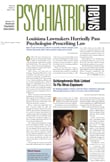A pioneering survey of Army soldiers under combat conditions in Iraq and Kuwait identified multiple problems in access to mental health care.
Only 27 percent of the soldiers who screened positive for depression, anxiety, or traumatic stress reported receiving help at any time during their deployment from a psychiatrist, other physician, mental health professional, or chaplain.
Less than one-third (32 percent) of soldiers who reported interest in getting help ultimately received it.
Problems these soldiers cited in getting care included difficulty in getting time off from work (43 percent), too difficult to get to location of services (26 percent), not knowing where to go for help (24 percent), and services not being available (24 percent).
Perceived stigma was also a barrier to the receipt of care. Soldiers reported that they might be seen as weak (59 percent), the unit leadership would treat them differently (58 percent), the unit would have less confidence in them (49 percent), and their leaders would blame them for the problem (46 percent).
The survey and other efforts to evaluate mental health services were undertaken by a 12-member team of Army psychiatrists, psychologists, and other professionals from August through early October 2003.
The team surveyed 756 soldiers, 82 percent of whom had engaged in combat, and talked with 34 focus groups of soldiers. Members of the team also interviewed mental health professionals, unit commanders, primary care physicians, and unit ministry teams.
In addition to Iraq, the team conducted interviews in Kuwait, Germany, and Fort Stewart, Ga.
According to team leader Col. Virgil Patterson, a social work officer, soldiers had never been studied “in this manner” about mental health issues during combat.
The team found that professionals responsible for providing mental health care had a different perception about the accessibility of care from that of the soldiers surveyed.
According to the survey, 90 percent of the psychiatrists and mental health professionals surveyed thought that soldiers had “good access to behavioral health services,” but only 56 percent of soldiers surveyed reported that they knew how to obtain “behavioral health care in theater.”
Fifty percent of the psychiatrists interviewed identified a need for a broader range of antidepressant medications than those available to them, and 33 percent indicated that additional “sleeping agents” and “stimulants” would be helpful.
Anecdotal reports from “forward-deployed psychiatrists” described logistical problems in filling prescriptions.
The team recommended a “circuit-rider” approach, in which psychiatrists or mental health professionals would visit outlying and smaller camps where soldiers have had limited access to services.
Other recommendations were to provide each combat theater with a mental health consultant who would conduct needs assessments, evaluate the quality of mental health services, make recommendations concerning evacuation policies for psychiatric treatment, oversee training, and establish mental health care standards.
The report of the Operation Iraqi Freedom Mental Health Advisory Team is posted online at www.armymedicine.army.mil. ▪
